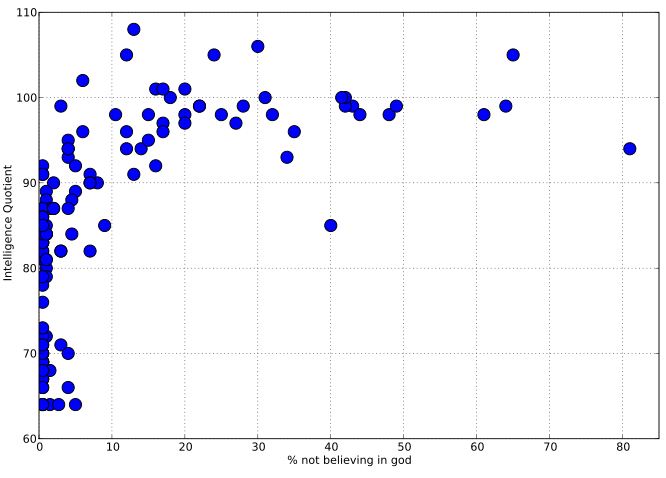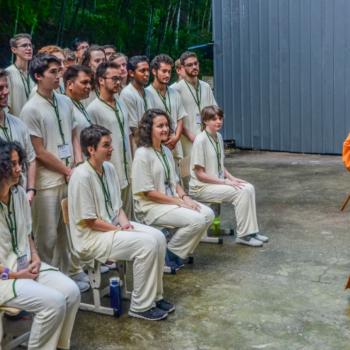A good friend of mine brought this study and commentary to my attention today:
On Whether the Job of an Ethicist Is Only to Theorize about Morality, Not to Be Moral
There, the philosopher of psychology Eric Schwitzgebel proposes five major points about the ethics professors’ apparent lack of moral improvement. These are:
- It might just be a professor’s job to theorize about ethics, not live them (at least not any more than everyone else).
- It seems odd that all of this theory shouldn’t seep into an ethics professor’s daily life though.
- Ethicists tend to espouse more stringent moral standards: e.g. 60% claimed that eating meat was immoral, vs 45% of other philosophers and 19% of professors in general. Yet ethicists display no marked change in behavior: just as many still eat meat.
- A countervailing force might be the “moral licensing” wherein ethicists are strict in certain aspects in their lives and thus let others go, such as being rigidly honest and yet totally lacking compassion.
– Or perhaps people drawn to ethics are a bit more ‘jerkish’ in the first place, and thus the study of ethics has improved them (us) to the point of being equal to the rest of the population.
– Or perhaps the clever rationalizing of ethicists makes them daringly act in immoral ways, knowing full well that they can justify it – thus the stricter activities and the justified immoralities balance one another out. - Perhaps we shouldn’t hold ethicists to their own standards, or even think that they should be more moral than the ‘average joe’.
My own response was that this is not surprising. My own experiences with ethics professors has been great – but then again, so has my experience with most academics.
And two of the most important moral exemplars of my life are a postal clerk and a social worker (my parents, both now retired).
Perhaps point two might be the crux of the argument or problem: the belief that studies of ethics would seep into the lives of ethics professors. After all, an ethics professors studies the reasoning behind moral decisions; so their work is more focused on reasoning: finding invalid arguments, counterexamples, etc, rather than living out ethics. So we should expect moral philosophers to be better at recognizing lousy reasoning and so on than the average joe…
Should we expect historians to be better at not repeating their own mistakes? Or psychologists to be more mentally healthy than other professionals?
As one commenter in the original post suggests: ethics professors are moral philosophers, not moralists. However, these days it’s hard to say just who the moralists are or should be…
Perhaps another suggestion might be that moral philosophers don’t, and shouldn’t necessarily be expected to, think about their own actions any more than anyone else. Plenty of non-philosophers drive themselves mad at times by analyzing situations and how they should behave. While they might not be able to formulate a full theory for their course of action, they can nonetheless come to a similar course as a typical moral philosopher would.
Perhaps a better data-set would help (what about the actions of non-academics). Perhaps if you are a moral philosopher who finds eating meat to be immoral, then eating less meat could be justified, maybe on the grounds of health requirements. And for those skipping out on paying conference dues: why did they do it? What about the others? I doubt it, but perhaps the moral philosophers had a better reason, such as having given the money to Oxfam as utilitarians (or, as utilitarians, deciding that their own benefit through beer and cheeseburgers would be greater than the benefit for themselves and others of paying the dues – sorry a low blow, I know).
I’m reminded a bit of a friend of mine who went to Yale Divinity School, and was told (and experienced) that it was a place where the faithful went to lose their beliefs. Paradoxically, the more theologically educated these students became, the skeptical they grew of religious beliefs. Is this analogous the the idea that moral behavior “should seep in” from moral studies? Should religiosity “seep in” to those who study it? Again, empirical evidence either way would be helpful. This study suggests that college in general is not at all corrosive to religious faith. Here’s UNL a study suggesting increased religiosity via education. Here’s an article and a paper suggesting that, at least in Canada, more education does lead to less religiosity.
And here’s a graph suggesting increased IQ is correlated with less belief in god:
Why do I bring this up? Because it could prove useful for understanding the nuances of morality in moral philosophers.
From the UNL study above:
“Education influences strategies of action, and these strategies of action are relevant to some religious beliefs and activities, but not others,” said Philip Schwadel, associate professor of sociology at UNL and author of the study. “The effects of education on religion are not simple increases or decreases. In many ways, effects will vary, based on how you define religion.”
And, likewise, how you define moral.
Perhaps the ethics professors who ate meat even while claiming it to be immoral are more moral than those who ate it not making that normative claim.
In any case, that’s a short rambling assessment on my own part.
A Kantian Assessment would suggest that knowing the right thing to do is easy, while being able to actually do it is hard. However, some people are thoroughly unwilling to do the right thing. For the case of meat eating, we might applaud those who believe it to be wrong, even if their action’s don’t follow (we can hope that with greater fortitude, over time, they will in fact be able to follow their beliefs). Those that don’t even believe this are thus less moral, as they are less likely to make the eventual move toward non-meat eating (assuming, of course, that meat eating is generally immoral).
The ethicist skipping out on his/her conference dues has a harder time justifying it. Even if he/she had a compelling reason, he/she must realize that if this reasoning were good, it might compel many others to follow suit, to the point where conferences were no longer viable because too few people paid the dues.
But again, I would love to see deeper discussions (rather than just yes/no statistics) in both cases.
In terms of Buddhist ethics, issues such as how the meat was acquired would become important. Most Buddhists are not vegetarian, yet their is a deep abiding concern for “all sentient beings” and the environment in general. And again returning to academia – while my experience with scholars of Buddhism has been mostly really great, I have heard more than a few stories of utmost bitter backbiting (though I did recently read that linguistics is especially known for being “spiteful,” “ridiculous,” and “childish.”). So studying something so peaceful and non-violent as Buddhism might not make you act as such. Then again, maybe Buddhists aren’t always as peaceful and nonviolent as we’d hope either…
I feel that I could ramble on… But that I am, well, rambling. Perhaps some of this will have been useful – perhaps you have better ideas… I’d love to hear them.












